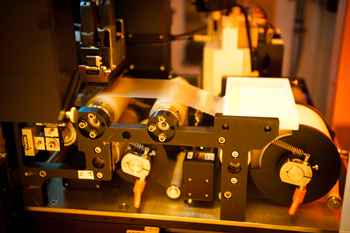Recent News
UNM Engineering Ph.D. candidate named ASCE ‘24 Outstanding Reviewer
August 11, 2025
UNM joins Brown University in national institute focused on intuitive, trustworthy AI assistants
August 6, 2025
UNM Engineering team wins ASEE best paper for work on first-year engineering course
July 17, 2025
New director will enhance interdisciplinary engineering learning opportunities
July 2, 2025
News Archives
UNM Collaborates on NSF Nanoscale Manufacturing Research Center
May 11, 2011
 The University of New Mexico will participate along with the University of Texas at Austin, the lead institution, and the University of California Berkeley on an $18.5 million, multi-year National Science Foundation grant to develop nanoscale manufacturing systems for mobile computing.
The University of New Mexico will participate along with the University of Texas at Austin, the lead institution, and the University of California Berkeley on an $18.5 million, multi-year National Science Foundation grant to develop nanoscale manufacturing systems for mobile computing.
The Nanomanufacturing Systems for Mobile Computing and Mobile Energy Technologies (NASCENT) Center will develop innovative nanomanufacturing, nanosculpting and nanometrology systems that could lead to versatile mobile computing devices such as wearable sensors, foldable laptops and rollable batteries.
UNM activities will be led by Distinguished Professor of Electrical and Computer Engineering, and director of the Center for High Technology Materials Steven R.J. Brueck. A testbed for nanomanufacturing metrology will be built at CHTM on UNM’s south campus. Brueck’s role in the center will be to establish the metrology or ways to monitor in near real time the products of nanomanufacturing tools.
“UNM is excited to be part of this Nanoscale Engineering Research Center,” said Brueck. “CHTM has a long history of contributions to measurement technologies for the semiconductor industry and others. This is the fourth active ERC that UNM is participating in, and the third at CHTM. There are only twenty active centers nationwide. Very few other schools have achieved this level of participation in these prestigious, highly competitive awards.”
Catalin Roman, dean of UNM School of Engineering, is proud of the School's participation in four ERCs. "With such a strong track record of successful participation in multiple ERCs, UNM Engineering is now well positioned to assume the lead institution role in a future ERC, which we hope to secure for the state of New Mexico," says Roman.
P. Randal Schrunk, a National Laboratory Professor from the Department of Chemical and Nuclear Engineering at UNM, will coordinate and integrate models at all scales of the nanomanufacturing test beds. Models include mechanics of roll to roll processing of nanoimprint lithography, grapheme transfer and related tasks. He will work with Professor J. Murthy at UT Austin.
In addition, Asst. Professor of Electrical and Computer Engineering Olga Lavrova will provide nanoscale device modeling and simulation.
These new technologies will provide breakthrough performance in energy efficiency, computing, communications and data/energy storage capacity. Today, 40 percent of the energy used in cellphones is for reading and writing data to the phone’s memory. Researchers working with the center will develop emerging manufacturing technologies to reduce energy needed for cellphone memory storage by up to three-quarters, while increasing data storage density by more than five times its current capacity.
The center will also work toward developing silicon nanowires for improved anodes in lithium ion batteries. The nanowires are projected to lead to a fourfold increase in the storage capacity of batteries.
“This grant is testimony to the research accomplishments and national competitiveness of our faculty,” says UNM President Robert Frank. “Mobile devices play such a big role in all of our lives now and our students will have an opportunity to participate in cutting edge research that will impact their future development.”
A recent report from the World Bank says there will soon be more mobile subscriptions than there are people in the world. Several industry partners participating in NASCENT include Texas Instruments, 3M, Lockheed Martin, Applied Materials and Corning Inc. among others. The award will also provide opportunities for outreach into K-12 education and research experiences for UNM undergraduate students.
Photo courtesy of UT Austin:
 Inside the nanomanufacturing tool for roll-to-roll nanosculpting on plastic substrates. The plastic substrate rolled on the tool consists of the primary film on which nanosculpting takes place to make flex electronic devices, protected by a peelable thinner film as shown.
Inside the nanomanufacturing tool for roll-to-roll nanosculpting on plastic substrates. The plastic substrate rolled on the tool consists of the primary film on which nanosculpting takes place to make flex electronic devices, protected by a peelable thinner film as shown.
Media contact: Karen Wentworth (505) 277‑5627; email: kwent2@unm.edu
